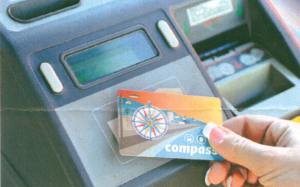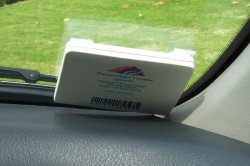RFID: Share Your Personal Data with the World!
 A few weeks ago I wrote that contactless payments will help drive mobile banking adoption. What I didn’t say is that you can also use RFID to broadcast your personal information to the world. Yes, RFID enabled passports can double as your personal radio station that keeps playing your same personal info over and over again. The good news is it has never been more affordable to have your own radio broadcast. The bad news is, it is apparently pretty easy to put together the equipment that will tune into your channel.
A few weeks ago I wrote that contactless payments will help drive mobile banking adoption. What I didn’t say is that you can also use RFID to broadcast your personal information to the world. Yes, RFID enabled passports can double as your personal radio station that keeps playing your same personal info over and over again. The good news is it has never been more affordable to have your own radio broadcast. The bad news is, it is apparently pretty easy to put together the equipment that will tune into your channel.
RFID (Radio Frequency Identification) is not a new technology. The origins of RFID trace back to WWII and the first RFID related patent was issued in 1973. From supply chain management to toll tags, RFID is certainly useful in a variety of applications. Still, RFID is not inherently secure. The potential problems are apparent in the latest RFID enabled US passports. The US includes a metal sleeve and Basic Access Code with new passports to try and keep thieves from stealing your personal information as you walk by.
NFC technology extends the RFID specification. NFC enabled devices must be in very close proximity in order to communicate. Thus, proponents assert that NFC is inherently more secure than plain old RFID. Still, not everyone is ready to start replacing cash with wireless payment systems. Despite an improved security profile, NFC enabled devices are vulnerable to a variety of attacks.
 Why does all this matter to financial institutions? More now than ever, financial instituions must prove that they are safe. The general perception of a bank’s commitment to cyber security can change very rapidly.
Why does all this matter to financial institutions? More now than ever, financial instituions must prove that they are safe. The general perception of a bank’s commitment to cyber security can change very rapidly.
I believe NFC enabled payment devices will eventually become very popular. There is a signficant amount of utility in a phone that will consolidate my rapid transit passes, affinity and rewards cards, coupons, and payment cards. However, this will only happen if mobile payments and the devices that make them possible are perceived to be secure. A recent survey found that security concerns is the number one deterent to mobile banking adoption.
Most of the mobile payment news I read focuses on convenience and new delivery technologies. Mobile technology companies mention security but they certainly don’t focus on it.
So to complete my answer to the question above, mobile payments represent a significant opportunity for financial institutions. However, unless the industry begins to promote security with technology improvements and additional marketing, it might be a while before NFC payments move past the focus group stage. Even worse, the big event that finally introduces NFC payments to the masses might be news of a major NFC related fraud rather than a human interest story on NPR about how mobile banking is spurring commerce in Kenya.












Yes, I think it has to be within less than an inch to work. However, it is not impossible to read your card information from large distances. I would not say they are overstating the secure those cards are, but the close proximity requirement alone is not much of security measure. There are some solutions out there that really do secure your card, but I am not sure if MasterCard (or any other issurer) has implemented them.
Here is a good paper that lays out potential security issues (you might have to register to download it).
http://d.scribd.com/docs/1c12nw1jridaf0e72ypf.pdf
Here is an article in eWeek that addresses concerns with RFID cards.
http://etech.eweek.com/content/security/rfid_puts_us_all_at_risk.html?kc=rss